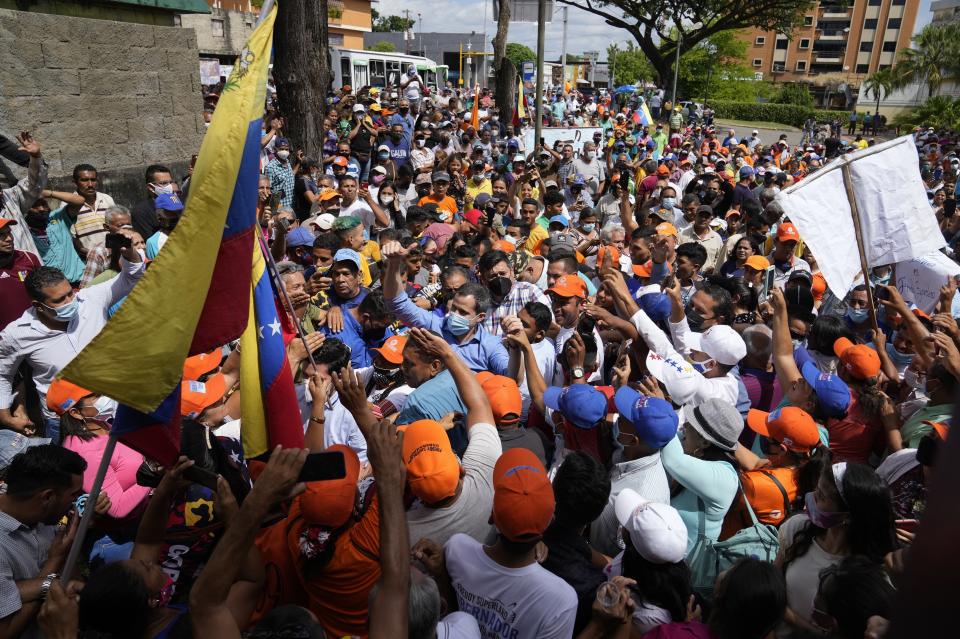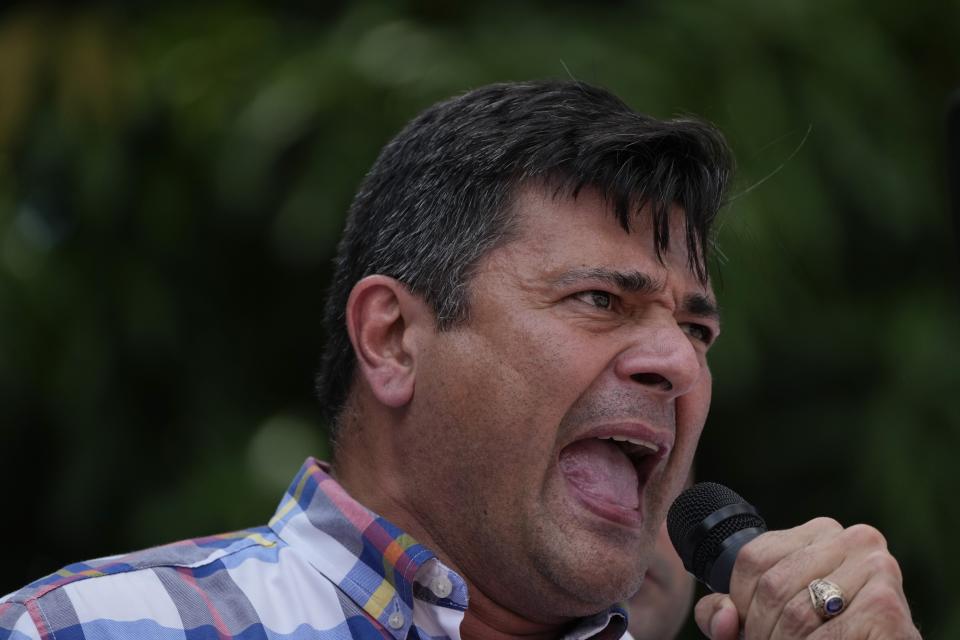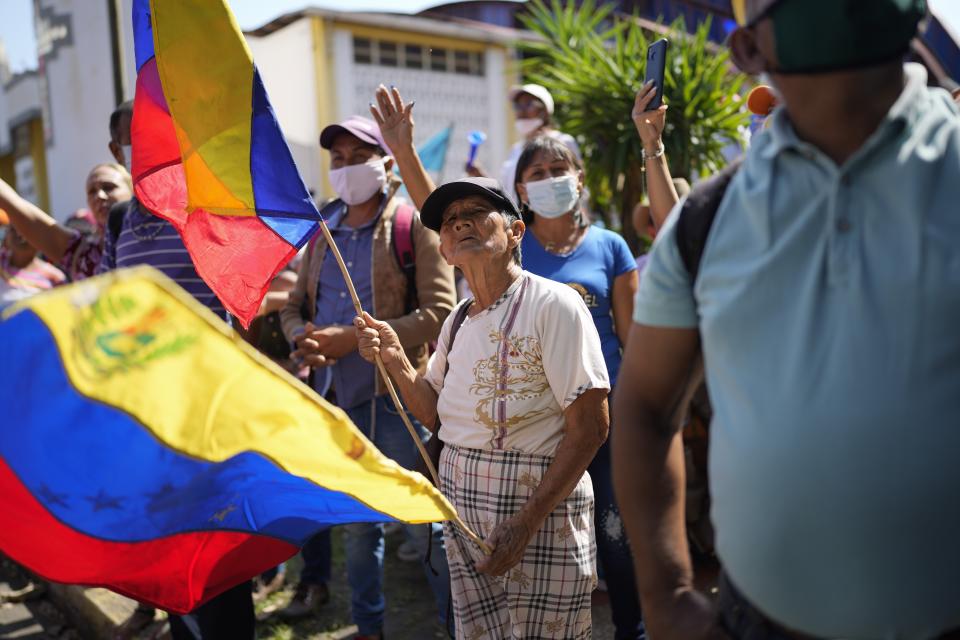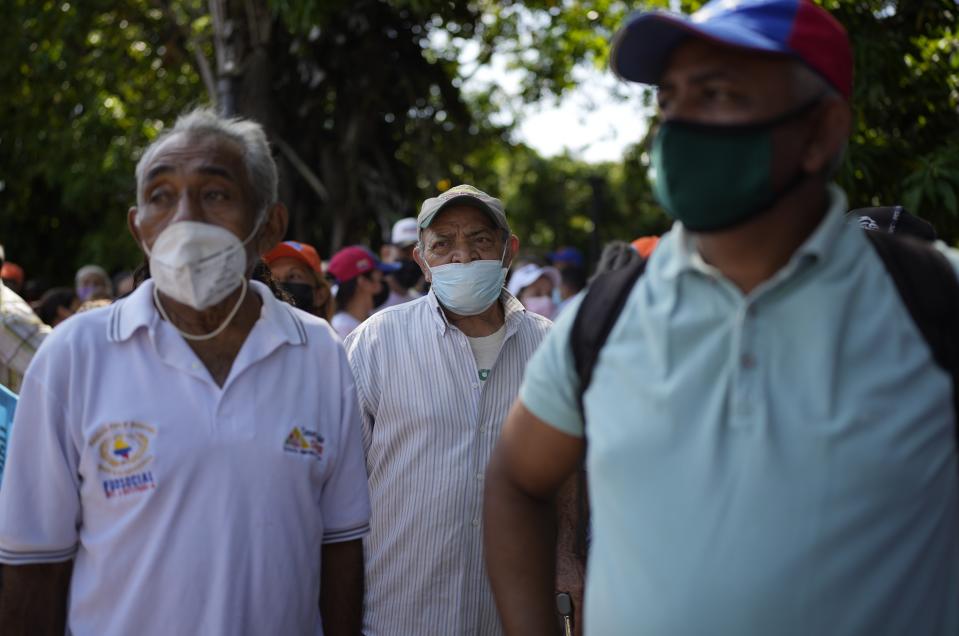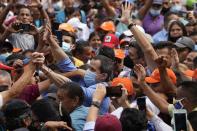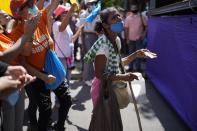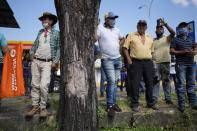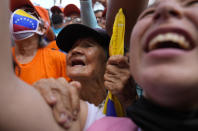Voters protest disqualification of Venezuelan candidate
BARINAS, Venezuela (AP) — About 500 supporters of a Venezuelan gubernatorial opposition candidate who was retroactively disqualified as the vote count showed him ahead in the home state of the late President Hugo Chávez protested Saturday against a decision that has become emblematic of what opponents say are unfair election conditions.
Under a heavy military and police presence, supporters of Freddy Superlano decried the decision of Venezuela’s highest court to schedule a new gubernatorial election in January, saying they are being robbed of the punishment vote they exercised against the ruling party’s candidate. They vowed to keep any pro-government candidate out of the governor’s office.
The northwestern state of Barinas has been considered a bastion of Chávismo. Superlano was ahead in the Nov. 21 race against incumbent Argenis Chávez, one of Hugo Chávez’s brothers. Argenis along with Adán Chavez and father Hugo de los Reyes Chávez have served as governors of the state of Barinas since 1998.
“It was a punishment against all the wrong they have done,” retiree Jose Montiya, 71, said. “The state should have been cared for like a little gold cup, the Chávez family has governed here, and look at how the state is.”
Montiya, whose pension is roughly $2 a month, then rattled a long list of concerns: serious gasoline shortages; lack of health care facilities; no basic services like gas, water and electricity; and hunger.
Venezuela’s Supreme Court of Justice on Monday ruled that Superlano should not have been on the ballot because he had been disqualified over an administrative sanction imposed in August stemming from his work as a legislator between 2015 and 2020.
The disqualification raised further doubts about the fairness of Venezuela’s electoral system following the first vote in years in which most major political forces agreed to take part and which was monitored by observers from the European Union. President Nicolás Maduro’s government invited the monitors but called them “spies” after they issued a preliminary report critical of the electoral system.
The court is one of many government bodies seen as loyal to the Maduro government. In past years, it and other agencies have blocked or ruled against major opposition parties and candidates.
People arrived at the protest outside a Catholic church by the busload from across the state or walking from nearby neighborhoods, where residents have seen their salaries and pensions shrink over the years and have been forced to pay a few dollars for a package of food that the government previously distributed for free. Many wore orange T-shirts and caps with their candidate’s name, waved Venezuelan flags and showed two thumbs down whenever Maduro was mentioned.
Among those at the protest, gasoline rationing was a common complaint about Argenis Chávez’ administration. He implemented a system that allowed people to refuel on a limited number of days, affecting everyday life for many. Ahead of the protest, the government announced it was ending the refueling system.
“We need to live better. We need to breathe, we feel drowned, tired, of these arbitrary people,” Barinas resident Raquel Coromoto, 57, said. “We feel like we are in a dictatorship and we want change.”
On Saturday, Superlano introduced his wife, Aurora Silva, as his party’s candidate for the Jan. 9 election. Argenis Chávez on Tuesday announced his decision to resign as governor and not run again as the ruling party’s candidate. The United Socialist Party of Venezuela had not picked a candidate as of Saturday.
Silva previously worked as a youth activist but has never held office before.
“I am sure that the regime did not think that we would respond in this way in Barinas. It is for the future of our children, women, it is for them that we are going to go (to the polls),” Silva said to the crowd. “We are on the right side of history and Barinas is an example; Barinas got up.”
Juan Guaidó, leader of the U.S.-backed faction of the opposition and who did not vote during the election, surprised protesters, who swarmed him as he arrived.
The report from EU observers concluded the regional contests happened under better conditions compared to the country’s elections in recent years but were marred by the use of public funds and other actions meant to benefit pro-government candidates. The monitors also noted that the elections were tainted by the disqualification of opposition contenders.
The observers on Saturday announced they would end their mission Sunday and return early next year to present an in-depth report. They did not make any comments on Superlano's disqualification.
The court’s decision was in response to a complaint filed by the political leader Adolfo Superlano, who alleged “violation of the constitutional rights to participation and suffrage” in Barinas. Adolfo Superlano, who is not related to the now-disqualified candidate, is one of seven opposition dissidents under U.S. economic sanctions after being accused of leading “actions that undermine democracy” in Venezuela.

 Yahoo Finance
Yahoo Finance 
